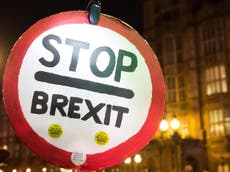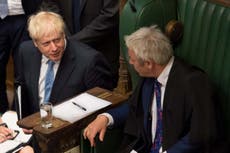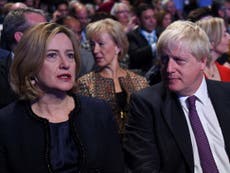These are the five most likely routes to a new Brexit referendum
The logic still holds (and Dominic Cummings once agreed) that there is no way out of this without seeking the people’s approval

Conventional wisdom has it that there’s going to be an election in November – and there’s now no chance of a Final Say referendum. But when it comes to Brexit, conventional wisdom is often wrong. In fact, there are at least five ways to get such a people’s vote, and only one involves having an election first.
Johnson loses an election
Boris Johnson may now look like he has a good chance to win an election. If the opposition forces are divided, he could get an overall majority with as little as a third of the vote.
But fast forward to 19 October. By then, if he obeys the law, he will have asked the EU to delay Brexit. Nigel Farage will say Johnson has betrayed the people and the Brexit Party will eat into the Tories’ vote.
The prime minister is already having a terrible time – losing votes in parliament, giving rambling speeches and seeing his brother quit the cabinet. Between now and mid-October, there will be many opportunities to harry Johnson, knocking both his morale and his standing in the country. Today’s decision by the Scottish court that his advice to the Queen to suspend parliament is illegal just the first.
What’s more, the Lib Dems, Greens, independent Conservatives and Plaid Cymru will have more time to agree how to join forces against a common foe. They are already talking. They may even find a way to involve Labour in loose local arrangements.
If all this happens, Johnson could well lose a November election. A Labour-led coalition or minority government would then take over. Since Jeremy Corbyn is now committed to holding a referendum, we’d soon be into a people’s vote campaign.
The PM bottles it
The prime minister now wants an election because he thinks he will win. But if he is worried he will lose, he may change his mind. It wouldn’t be the first time. Remember how he gave up the battle to succeed David Cameron just after the 2016 referendum?
If Johnson wants to avoid an election, the clear alternative would be to call a referendum. Although this would be a U-turn, he could say that he toyed with the idea of two referendums back in 2016. Dominic Cummings, now his top adviser, said then that there was a “strong democratic case” for having one referendum on the principle of Brexit and another on the terms of Brexit. Quite so.
Johnson might worry that he would lose such a referendum. But if he has to pick his poison, he might think that was preferable to losing an election. After all, since it would take around six months to organise, he wouldn’t be the shortest-serving prime minister in history. And even if he lost the referendum, he might just find a way to hang onto power.
MPs force a people’s vote
Johnson can’t just call a snap election anyway. As we saw this week and last, he needs two thirds of MPs to agree.
At the moment, Corbyn is saying he’ll back an election as soon as Johnson has secured a delay to Brexit. But the Labour leader could change his mind, as his deputy Tom Watson is urging him to.
Corbyn might switch tack to a referendum if he thought he’d lose an election. And even if he thought he would win, we’d still need a people’s vote to resolve the Brexit issue. So why not have one first and hold the election afterwards? If Labour agreed, it and the rest of the opposition could pass legislation to hold a referendum.
Some pundits will say that the government can sabotage laws that involve public spending – and that means Johnson could stymie a referendum if he doesn’t want one. But parliament is sovereign and, if it’s determined, it can make the government do what it wants.
Only this week, after all, it passed a law forcing the prime minister to ask for extra time despite his vow to leave the EU on 31 October “do or die”. It wouldn’t be beyond the wit of MPs to change the convention under which only the government can propose how public money is spent.
PM gets a deal
This week’s law doesn’t force Johnson to ask for extra time if he can persuade MPs to back a deal to leave the EU. That may be why he now seems to be redoubling his efforts to get a deal. If so, his best bet could be to alter the notorious backstop designed to keep the Irish border open so it applies only to Northern Ireland rather than the whole of the UK.
At the moment, he is only going part of the way, proposing some checks on agricultural products that cross between Great Britain and Northern Ireland. That won’t convince the EU. But if he went the whole way and agreed to comprehensive checks on both manufactured goods and agricultural products, the EU would be happy.
Johnson’s allies, the DUP, would scream blue murder as such a deal would distance Northern Ireland from Great Britain. But enough other MPs might decide to approve the deal if the prime minister agreed to put it to the people in a “confirmatory referendum”.
Johnson quits or is sacked
At the start of last week, the government had a majority of just one MP in the House of Commons, even when including the 10 DUP MPs. Since then, Johnson has lost an MP to the Lib Dems, expelled 21 others and seen Amber Rudd quit the party in sympathy with those who were driven out.
As a result, the opposition now easily has the numbers to win a vote of no confidence in Johnson. They might do this if he broke the law requiring him to ask the EU for extra time – or simply because they had had enough of him. The prime minister himself might fall on his sword – perhaps because it was the only way to avoid asking for a delay to Brexit without breaking the law.
If Johnson quits, the assumption is that there will then be an election. But a national unity government might instead be formed with the purpose of holding a Final Say referendum.
That may not seem likely now. But who would have predicted two months ago that we would be where we are today?
Hugo Dixon is chair of InFacts and deputy chair of the People’s Vote campaign






Join our commenting forum
Join thought-provoking conversations, follow other Independent readers and see their replies